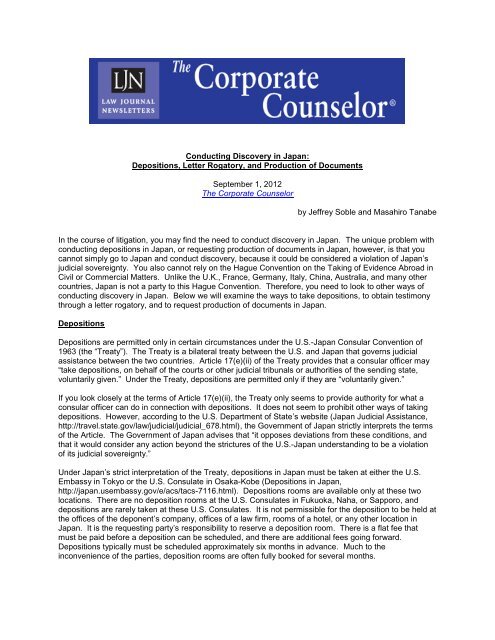The Duty of Letters Rogatory in International Law: Key Insights
Letters rogatory offer as an essential instrument in global legislation, helping with cross-border lawful help by allowing territories to formally ask for evidence and activities from one another. What implications might these difficulties have for future legal procedures?
Definition of Letters Rogatory
In the world of global regulation, letters rogatory act as official requests released by a court in one jurisdiction to look for support from a court in an additional jurisdiction. Letters rogatory. These requests are particularly significant in cross-border lawful proceedings, where the enforcement of a court's order or the celebration of evidence may be restrained because of administrative limitations

The process generally calls for the asking for court to verbalize the specific details or activity needed from the international court, sticking to the legal methods and conventions developed between the territories included. Once provided, the letters rogatory are sent via polite networks, which might include consular offices or consular offices, to make sure that the request is identified and acted upon by the international court. Generally, letters rogatory exemplify the participating structure necessary for effective global legal procedures.
Historical Context
Although the technique of letters rogatory has ancient origins, its formalization within the framework of global legislation arised substantially in the 20th century. Historically, such ask for judicial help were utilized in different legal traditions, including Roman legislation, where they facilitated cross-border teamwork in lawful matters. The idea acquired renewed focus with the rise of globalization and the boosting complexity of worldwide legal communications.
The mid-20th century saw the establishment of treaties and conventions that sought to standardize the process of letters rogatory. Notably, the 1970 Hague Convention on the Taking of Evidence Abroad in Business or civil Matters provided a structured strategy, enhancing the efficiency of these requests - Letters rogatory. This duration marked a shift from informal plans to an extra methodical framework, which dealt with the challenges posed by varying national lawful systems
As states ended up being much more synergistic, the demand for efficient systems to gather proof throughout boundaries emerged, enhancing the duty of letters rogatory in promoting global teamwork. Today, they stay an important tool for acquiring proof and ensuring that justice transcends nationwide boundaries, reflecting the developing nature of global law in reaction to international difficulties.
Process of Issuing Demands
The procedure of providing letters rogatory typically entails a number of vital actions developed to ensure that ask for judicial aid are clear, details, and compliant with both global and domestic lawful standards. An event looking for support has to prepare a formal demand that lays out the pertinent realities of the case, the relief sought, and the particular evidence or statement called for. This file needs to be crafted with accuracy to satisfy the lawful demands of the jurisdiction in which it will be submitted.
Following the prep work of the request, it is sent to the proper authority, often a court or a designated governmental firm. This authority evaluates the demand to ensure it follows lawful criteria and procedural norms. As soon as accepted, the demand is sent to the international territory with polite channels.
Upon invoice, the foreign court examines the demand's compliance with its local legislations and methods (Letters rogatory). If approved, it continues to perform the request, which might include the issuance of subpoenas or the collection of evidence. Throughout this process, keeping clear communication in between the requesting and getting territories is vital to make sure effective teamwork and the gratification of the demand
Difficulties and Limitations
Constraints and difficulties frequently arise in the procedure of carrying out letters rogatory, commonly stemming look at this website from varying legal systems and procedures in between jurisdictions. One substantial challenge is the varying requirements of admissibility for evidence, which can bring about difficulties in the acceptance of documentation asked for through letters rogatory. Additionally, the lack of uniformity in legal terms and interpretations can produce misunderstandings, making complex interaction between courts in different countries.
Additionally, hold-ups are typical because of governmental procedures, as the demand may need to travel through several layers of legal authorities before it is met. In some circumstances, the asked for territory might do not have the essential resources or determination to cooperate, even more hindering the process. Language obstacles likewise add to obstacles, as exact translation of legal records is important for ensuring that the intended message is shared without distortion.
Last but not least, sovereignty worries might occur, as some states hesitate to abide by demands that they perceive as infringing upon their legal freedom. These difficulties highlight the complexities inherent in making use of letters rogatory, demanding higher harmonization and collaboration amongst global lawful systems to enhance their performance.

Influence On International Collaboration
Recognizing the significance of letters go to my site rogatory in fostering international collaboration is essential, as these requests facilitate cross-border legal support and promote collective initiatives in criminal and civil issues. By allowing one territory to formally ask for aid from an additional, letters rogatory create a structured legal framework that boosts the efficiency of international communication between judicial authorities.
The usage of letters rogatory assists to establish shared trust and regard among nations, which is vital in an increasingly interconnected globe. They work as a device not only for gathering proof but likewise for guaranteeing that legal procedures are maintained throughout boundaries. This is specifically essential in combating transnational criminal offense, where the inability to protect participation can weaken justice.
Furthermore, the dependence on letters rogatory can streamline complicated lawful process, minimizing hold-ups and unpredictabilities in global examinations. The step-by-step safeguards intrinsic in this procedure add to the security of private civil liberties while facilitating cooperation amongst states. Inevitably, the impact of letters rogatory on worldwide teamwork highlights their function as vital devices in the promotion of justice, fostering a collaborative spirit that goes beyond lawful systems and national limits.
Conclusion
In final thought, letters rogatory serve as an essential instrument in worldwide regulation, facilitating cross-border legal help and cooperation. The continued development of these devices is essential for boosting the effectiveness of international legal procedures, inevitably cultivating stronger collaboration in both civil and criminal issues across jurisdictions.
Letters rogatory serve as an essential tool in global law, helping with cross-border legal support by enabling jurisdictions to formally request evidence and actions from one another.The process normally needs the asking for court to verbalize the certain information or action needed from the foreign court, adhering to the lawful protocols and conventions developed in between the territories entailed. Historically, such demands for judicial assistance were utilized in various legal traditions, consisting of Roman regulation, where they promoted cross-border participation in lawful issues.The procedure of providing letters rogatory normally includes a number of vital steps designed to ensure that demands for judicial description aid are clear, details, and compliant with both domestic and international legal standards.Moreover, hold-ups are typical due to bureaucratic procedures, as the request might require to pass through numerous layers of lawful authorities before it is fulfilled.